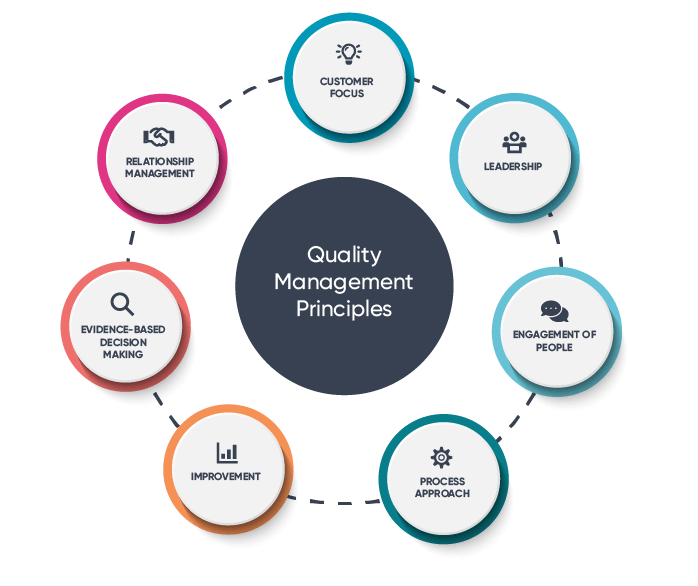The 7 principles of quality management
The ISO 9001:2015 standard on quality management systems is based on general principles: 7 quality management principles are used, compared to 8 for the 2008 edition.
These principles are developed in §2.3 of ISO 9000:2015 (“Quality management systems — Fundamentals and vocabulary”), some of this information is repeated in Annex B of ISO 9001:2015.
This article builds on these standards to present the “philosophy” of the management principles. Each principle is illustrated with a quote, for ease of understanding.
The 7 principles of quality management
The headings are from ISO 9000:2015, some are obvious and natural, all make good sense.
- Customer focus
- Leadership
- Engagement of people
- Process approach
- Improvement
- Evidence-based decision making
- Relationship management
To convince you of the validity of this approach let’s imagine these 7 principles, but in reverse :
- Customer exploitation
- Irresponsible leaders
- Uncommited staff
- Random approach
- Regression
- Decisions based on a coin toss
- Disregarded stakeholders
1 – Customer focus
There is only one boss. The customer. And he can fire everybody in the company from the chairman on down, simply by spending his money somewhere else.
Sam Walton (founder of Wal-Mart)
The challenge of this principle is to satisfy the customer, to build loyalty.
This is even more important as nowadays, with social networks and the internet in general, the customer can express his dissatisfaction / his delight and be heard by all, immediately. This can either destroy an organisation’s image or, on the contrary, give it an excellent reputation.
To strengthen its customer focus, the organisation must work on its customers’ expectations: identify them (and even anticipate them) and do everything possible to ensure that the products / services offered meet them.
2 – Leadership
Leadership is the art of getting someone else to do something you want done because he wants to do it.
Dwight Eisenhower
Management is expected to:
- Define the objectives of the organization
- Ensure the availability of resources to achieve the objectives
- Involve staff
Thus, the organisation knows where it needs to go, has the means, and the desire.
3 – Engagement of people
Tell me and I forget. Teach me and I remember. Involve me and I learn.
Benjamin Franklin
The title of this principle is reductive: as well as being “engaged” (thanks to the great work of their management) staff need to be qualified and feel valued.
It’s about looking at the individual beyond the worker.
The added value of the work of the staff and the initiatives taken must me recognized. Personal skills must be developed, which will improve the skills of the organisation as a whole.
4 – Process approach
A civilisation that proves unable to solve the problems that its functioning creates is a decadent civilisation.
Aimé Césaire
To have a process approach is to consider the activity of the organism as a set of correlated sub-activities. In this model, each process uses input data and produces output data. This data can flow from one process to another.
This approach makes it easier to deal with the various activities, their management, their needs, their objectives… It is moreover natural for a company to organise itself into services, each managing one (or even several) processes.
5 – Improvement
Life is like riding a bicycle. To keep your balance, you must keep moving.
Albert Einstein
The organisation must constantly seek to improve itself (continuous improvement), at a minimum to maintain its performance levels, ideally to progress.
Improvement applies to principles already stated: improving customer satisfaction, improving process performance. In ISO 9001:2015, reducing the risks, seizing opportunities or correcting non-conformities are all sources of improvement.
6 – Evidence-based decision making
What can be asserted without evidence can be denied without evidence.
Euclid
A very Cartesian approach that can only be appealing, except that it requires work.
The idea is to reduce the uncertainty that is inevitable when making decisions, by relying on objective data, where you look at causes to understand effects.
7 – Relationship management
Relationships are the mirror in which we discover ourselves.
Jiddu Krishnamurti
The stakeholders encompass all actors who influence or are influenced by the activities of the organisation.
They include: suppliers, banks, regulator… and even ISO 9001.
It is by communicating with the interested parties and taking their requirements into account that the organisation will be able to improve its performance


1 Comment